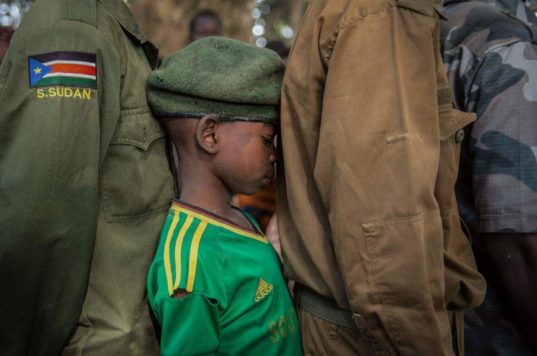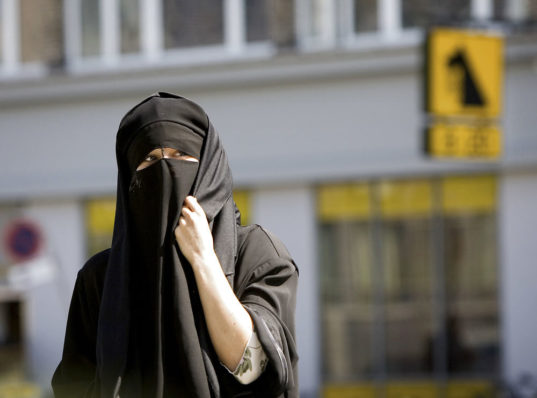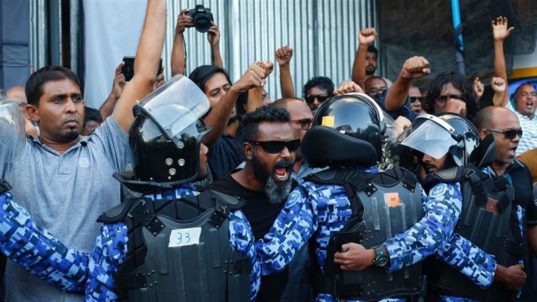|
| |
This week in: Peace & Security Publications |
IPSI | Africa | Americas | East Asia | Europe & Central Asia | Middle East | South Asia
|
|
|
|
| |
This week in Sub-Saharan Africa
|
|
|
|
| |
KENYA: Opposition lawyer charged with treason and deported over Odinga ‘swearing-in’
On Tuesday, the government deported senior opposition lawyer Miguna Miguna after charging him with treason in the latest move of a wide-ranging crackdown on political opponents and an intensifying confrontation with the judiciary. The lawyer was arrested last week in a dawn raid on his home in Nairobi after taking part in a mock swearing-in ceremony for opposition leader Raila Odinga that was attended by thousands of people. Judges had ordered the authorities to free Miguna, but instead, he appeared in the court of a small town 37 miles from the capital, to be charged with attending and consenting to the administration of an oath to commit a capital offense. Comment: Government lawyer called the ceremony an act of treason. Three TV networks were closed after broadcasting it, of which only two have reopened. Fourteen opposition members have had their passports suspended. (The Guardian, Reuters, Quartz )
|
|
|
|
|
| |
SOUTH SUDAN: More than 300 child soldiers released

|
|
On Wednesday, the UN Mission in South Sudan, UNMISS, announced that 311 children, including 87 girls, will begin reintegrating in their communities. According to UNMISS research, the South Sudan Liberation Movement had recruited 563 children, while the Sudan People’s Liberation Army in Opposition gathered 137. Negotiations to release the children were carried out by UNICEF, state and local authorities, as well as local groups. UNMISS said it had provided peacekeeping troops to escort religious leaders into remote bush areas to make contact and negotiate with armed groups. The move was hailed by the UN Mission as an important first move toward the release of tens of thousands of child soldiers believed to be fighting in the country’s civil war. It is expected that about 700 children will be liberated in the weeks ahead as part of a process that stalled when fighting intensified in 2016. Comment: A peace accord was signed in August 2015 to end the South Sudanese civil war, however, the deal fell apart and fighting continued. The war has resulted in tens of thousands of people being killed and a quarter of the country’s 12 million population forced from their homes. UNICEF, the UN’s children’s agency, has stated that both sides are using children to fight. (Aljazeera, The Guardian, Los Angeles Times, UN News Centre)
|
|
|
|
|
| |
SOUTH AFRICA: African National Congress says President could quit within days
| |

|
On Tuesday, President Zuma’s scheduled State of the Nation Address in parliament was postponed as pressure grows on him to step down as president. The Nelson Mandela Foundation called on the president to step down, saying South Africa has reached a point where any further time he spends in office will damage the country. Over the past week, opposition parties and factions within the African National Congress (ANC) itself has also called for Zuma to step down before the State of the Nation Address. Among these is a coalition of civil society bodies under the banner of Future South Africa, which published an open letter to the ANC urging the party to force him out. Comment: Zuma, who has survived several no-confidence votes and now faces more than 783 counts of corruption, has maintained his innocence thanks to the backing of some ANC members of parliament. Zuma has led the ANC since 2007 and has been South Africa’s president since 2009. His tenure in both posts has been controversial, with a series of corruption scandals undermining the image and legitimacy of the party that led South Africans to freedom in 1994 and has ruled ever since. (The Guardian, Aljazeera, Herald Live, NBC News)
Researched/Written by Brian Adienge
|
|
|
|
|
| |
This week in the Americas & Caribbean
|
|
|
|
| |
BRAZIL: Violent clashes between military and civilians days before Carnival
On Wednesday, more than 3,000 federal military forces were called into Rio de Janeiro to keep some of the city’s motorways open in response to clashes between police and armed gangs. Three highways were shut down due to the violence. A three year old was killed when a gang opened fire on her parent’s car, as well as thirteen year old who was killed while walking to school. This was the third time within a week that Brazilian police were forced to close off highways. Nine people were also killed between Friday and Sunday in separate gunfights. Comment: Brazil’s Rio Carnival starts this upcoming Sunday, and will attract an estimated 1.5 million tourists. There is hope among analysts that this will cause a change in the economy which is in a recession from the decrease in oil prices. (Folha, Rio Times, The Guardian)
|
|
|
|
|
| |
COLOMBIA: National Liberation Army plans armed strike in protest of suspended peace talks
On Wednesday, the National Liberation Army (ELN) rebel group announced their plan to initiate a three-day national “armed strike” and economic shutdown beginning Saturday to protest the government’s decision to suspend peace talks. While the ELN recommended people avoid travel, the government denounced the move, claiming these to be tactics only a criminal organization would utilize. According to the statement released by the ELN, all rebel units will comply with their orders, but some analysts believe is unlikely to be heeded by most of the country. Comment: With the Colombian presidential election coming in May, it is likely that continued actions along these lines will only add appeal to candidates who believe an aggressive military approach is the only way to stop rebel activity in the region. (Colombia Focus, Colombia Reports, City Paper Bogota, Reuters)
|
|
|
|
|
| |
COSTA RICA: Presidential election enters runoff
On Monday, voting booths closed and no winner could be selected as evangelical preacher Fabricio Alvarado led former government minister Carlos Alvarado (no relation) 24.8 percent to 21.8 percent. Although Fabricio Alvarado was able to increase his polling numbers from 3 percent to 26 percent of the vote in just three weeks, it was not enough to secure the election with the required 40 percent. The second round will take place on April 1st with the two candidates contending for the votes that went to other eleven candidates in the first round. Comment: In early January the Inter-American Court of Human Rights endorsed same-sex marriage; this ruling is binding for most Latin American states and has been a leading debate issue this election. Analysts assume Fabricio’s opposition to same-sex marriage allowed for his quick rise in the polls. (Costa Rica Star, BBC, Reuters)
Researched/Written by Connor Murnane
|
|
|
|
|
| |
This week in East Asia & Pacific
|
|
|
|
| |
PHILIPPINES: War not an option in South China Sea dispute with China
On Monday, the Philippines’ government declared that it relies on the principle of “good faith” and that war is not an option in resolving its South China Sea dispute with China. President Duterte’s government affirmed that it is aware of the ongoing activities in the disputed areas but believes Beijing will not reclaim new artificial islands. The statement followed recent reports that China is close to finishing the transformation of several reefs into artificial islands with military installations. Comment: These reefs, according to the Permanent Court of Arbitration, are within the Philippines’ 370-km exclusive economic zone (EEZ). (Philippine Daily Inquirer, Aljazeera, Pakistan Times)
|
|
|
|
|
| |
NORTH KOREA: U.S. to increase economic sanctions against North Korea
On Wednesday, U.S. Vice President Mike Pence stated that U.S. sanctions will increase against North Korea. Pence briefly attended the Winter Olympics opening reception, avoiding shaking hands with the leader of the North Korean Olympic delegation, Kim Yong Nam, and skipping the reception where his assigned seat was opposite Kim. Comment: Despite condemning the North Korean government prior to starting his trip, Pence had not ruled out meeting with the North Korean officials. While the U.S. and Japan continue in their hardline efforts toward North Korea, South Korea has been attempting to reduce tensions through dialogue and other more collaborative means. It remains to be seen, following the Olympics, if the U.S. and South Korea will resume their joint military exercises – which North Korea has deemed as “provocations.” (FT, Newsweek, NPR, Washington Post)
|
|
|
|
|
| |
SINGAPORE: Southeast Asian nations to improve cooperation in counterterrorism measures
On Tuesday, member states of the Association of Southeast Asian Nations (ASEAN) pledged to increase and improve cooperation to address the “growing terror threat” in the region. In a joint statement, regional defense ministers affirmed their commitment to fight against terrorism. The push for further counterterrorism cooperation comes as many terrorist foreign fighters return to the region from Iraq and Syria. Comment: Last year, ISIS Islamic insurgency increased in the Philippine city of Marawi. Its rise sparked an alarm that the defeated self-proclaimed Islamic State was seeking to relocate itself in the region. (Channel News Asia, Straits Times, Reuters)
Researched/Written by Edgar Peter Mutta
|
|
|
|
|
| |
This week in Europe & Central Asia
|
|
|
|
| |
DENMARK: Government leaders planning proposal to ban face veils

|
|
On Tuesday, Justice Minister Soren Poulsen announced plans, aligned with the Danish People’s party, to fine people for covering their faces in public. The objective of the proposed bill is to stop Muslim women from wearing burqas and niqabs. Poulsen said these dresses were “incompatible with the values in Danish Society.” Discussion about the ban has been present for the last several months, but the Danish People’s party is planning to submit legislation this spring to fine any woman wearing face veils 1,000 Danish crowns for a first offense, and up to 10,000 Danish crowns (USD 1,658) for repeat offenders. Eva Hansen, a previous minister affiliated with the Liberal party, expressed disapproval of the proposed ban and will have to cooperate with other parties to gain a majority of the votes if the bill comes forth. Comment: The proposed legislation is part of a wider debate of religious freedom vs. secularism. Other European countries have introduced bans in recent years. France, Belgium, and Spain adopted similar laws in 2010.The Belgian ban was upheld by the European Court of Human Rights, but Spain’s court removed their ban in 2013. (The Local DK, IB Times, BBC, The Guardian 1, 2, Reuters)
|
|
|
|
|
| |
ITALY: Right-wing extremist attacked six African migrants in drive-by shootings
On Saturday, a far-right extremist injured six African migrants in Macerata in a series of shootings. Luca Traini was arrested for the attack. Police believe the suspect acted in retaliation after a Nigerian man had been arrested for killing a young Italian woman a few days prior. Traini previously ran as a far-right candidate in a local election, but failed to gain enough votes. Comment: The shooting is representative of the rise of right-wing populism and anti-migrant rhetoric in light of the upcoming general election on March 4th. On Tuesday, the Italian Foreign Minister, Angelino Alfano, warned that the Italian citizens need to overcome populism and immigration fears by voting for the centrist party during the election. More than 600,000 migrants have reached Italy since 2014 which has fueled right-wing party rhetoric in the upcoming election. (The Local IT, France 24, Deutsche Welle, Al Jazeera, The Guardian 1, 2,)
|
|
|
|
|
| |
UNITED KINGDOM: 21 people arrested for trafficking migrants across the English Channel
| |

|
On Tuesday, British police raided 20 buildings and arrested 21 people suspected of human trafficking across the English Channel. Those arrested were part of a larger ring that brought hundreds of male Iraqi Kurds, and some families, to the UK from countries such as France, Belgium and the Netherlands. Migrants were charged 5,000-10,000 pounds for their transportation. The National Crime Agency reported that 350 officers participated in the raids in London, and in the northeast and south coast of England. After a year long investigation, the police raided multiple homes and carwashes that were allegedly used for money laundering in affiliation with the network. Comment: On the same day, French police also raided a location called “Vietnam City” in Calais where hundreds of Vietnamese migrants waited to be smuggled into the UK. Such coordinated activities are emblematic of the growing cooperation between France, Belgium, the Netherlands, and the UK to interrupt human trafficking routes to the UK. (The Independent, BBC, The Guardian, AP)
Researched/Written by Daniel Boerger
|
|
|
|
|
| |
This week in the Middle East & North Africa
|
|
|
|
| |
GAZA: The UN warns of a humanitarian disaster in Gaza
On Wednesday, Roberto Valent, Head of the United Nations Programme of Assistance to the Palestinian People asked for USD 6.5 million of donor contributions to provide 7.7 million liters of emergency fuel to Gaza as a bare minimum needed to stave off a collapse of services. Although the Gaza Strip requires an estimated 600 megawatts of electricity, it currently receives only 120 megawatts from Israel and another 32 megawatts from Egypt. Gaza’s sole functioning power plant, meanwhile, is only able to generate 60 megawatts of electricity, according to the Palestinian Energy Authority. Comment: Inhabitants in the Gaza Strip have seen their access to goods and freedom of movement restricted since 2007 due to Israeli policies and the military operation by the Egyptian army against ISIS-affiliated militias in north Sinai. The power limitations have led to two million Palestinians living in the area having to survive on fewer than eight hours of electricity a day. (Aljazeera, Haaretz, Middle East Monitor)
|
|
|
|
|
| |
RAN: Twenty-nine women arrested for Hijab protests
On Friday, the Iranian Police forces detained 29 women in Tehran for their involvement in protests against the country’s obligatory headscarf law. Women across Iran have been removing their headscarves in public to protest Iran’s strict Islamic dress code. Videos and photos shared on social media showed female demonstrators standing on utility boxes on street sidewalks, defiantly waving their hijabs. Comment: The mandatory headscarf, or hijab, has been in place in Iran since 1979, after the Iranian revolution and the installation of Ayatollah Khomeini as Supreme Leader. Over the years, hundreds of thousands of Iranian women have protested against the law as a part of social rights movements against the government’s violations of personal and human rights. (Aljazeera, New York Times, CNN)
|
|
|
|
|
| |
SYRIA: Nearly 200 Syrians killed in Russian and Syrian strikes in Eastern Ghouta and Idlib
On Thursday, the death toll in Syria’s Eastern Ghouta suburb and Idlib province climbed to at least 180, including children and women, as the Syrian regime and Russian forces continued their air attacks on the rebel-held areas. On Tuesday the UN said that the situation is “extreme” and appealed for a ceasefire. An estimated 400,000 people are trapped in the Eastern Ghouta, which has been under a siege by pro-government forces since 2013. Comment: “People here believe Russia is taking revenge after its plane was shot down by the rebels on Saturday and its pilot killed,” said Hazem Shami, an opposition activist in Eastern Ghouta. The Russian government did not comment on the deaths caused by the strikes. (Aljazeera, BBC, Reuters)
Researched/Written by Mohamed Ismail
|
|
|
|
|
| |
INDIA: Unlicensed doctor infects 33 people with HIV
On Tuesday, police officials announced the launch of an investigation against an unlicensed doctor who allegedly infected at least 33 people with HIV in the town of Bangarmau by reusing an infected syringe while providing treatment. The 33 people were diagnosed at government screening camps in the Unnao district last month and were asked questions that lead to the source of the infection. The unlicensed doctor has been arrested and is being questioned; the medical instruments that were in his possession are being tested to solidify the connection between the doctor and those infected. Comment: As a result of financial constraints and a shortage of doctors, many patients in India seek out unqualified practitioners. The Indian Medical Association estimates that approximately 45 percent of the people in India who practice medicine have no formal training. (The Indian Express, BBC News, Reuters)
|
|
|
|
| |
MALDIVES: President Yameen declares state of emergency

|
|
On Monday, President Abdulla Yameen declared a fifteen-day state of emergency following the Supreme Court’s decision last Thursday to release and re-try nine opposition politicians based on the fact that their trials were politically motivated and unfair. Hundreds of protesters gathered in the capital following the court’s decision in an effort to get Yameen to comply with the ruling. These protests resulted in clashes between demonstrators and the police. Yameen sent security forces to arrest two Supreme Court judges and an opposition leader who is also his estranged half-brother, former President Maumoon Abdul Gayoom. In a televised address, Yameen stated that he declared the state of emergency in order to hold the judges accountable and to investigate how deep the plot is to have him removed. On Tuesday, the remaining Supreme Court judges published a new ruling online to annul their previous decision to release and re-try the nine opposition politicians. Comment: The Supreme Court’s February 1 ruling also reinstated twelve opposition party members of parliament, giving the Maldivian Democratic Party a majority in parliament. Former President Mohamed Nasheed and members of the Maldivian Democratic Party are asking for international intervention, urging the United States to impose targeted sanctions on President Yameen and his allies; they are also asking India to send an envoy backed by its military. (Maldives Independent, Aljazeera 1, 2, The Guardian)
|
|
|
|
|
| |
PAKISTAN: 31 convicted for lynching of student accused of blasphemy
| |

|
On Wednesday, a Haripur anti-terrorism court (ATC) convicted 31 people over the campus lynching of Mass Communications student, Mashal Khan, last year at Mardan’s Abdul Wali Khan University. Mashal Khal was beaten and then shot to death by an angry mob after he was accused of blasphemy by several members of the campus community. The lynching was filmed and the video circulated on social media, creating a debate over blasphemy laws in Pakistan. One of the convicted persons who confessed to shooting Mashal was sentenced to two death sentences, 5 were handed life in prison sentences, 25 others received two concurrent jail sentences of up to three years, and 26 people were acquitted due to insufficient evidence. Comment: Blasphemy is a charge that carries a judicial death sentence in Pakistan; however, two months after Khan’s death investigators concluded that Khan was falsely accused. The 31-convicted people include students, teachers and some officials of Abdul Wali Khan University. (Dawn 1, 2, The Guardian, Reuters)
Researched/Written by Pamela Mhute
|
|
|
|

|
|